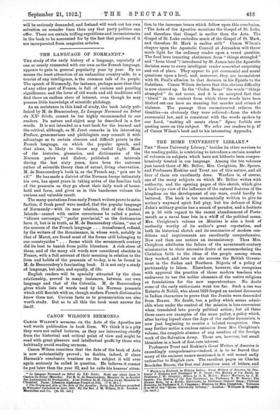CANON WILSON'S SERMONS.t CANON Wilson's sermons on the Acts of
the Apostles are well worth publication in book form. We think it is a pity they were not called lectures, as they are interesting chiefly from the historical and critical point of view and might be read with great pleasure and intellectual profit by those who habitually avoid reading sermons.
Canon Wilson considers that the date of the book of Acts is now substantially proved ; he doubts, indeed, if since Harnack's conclusive treatises on the subject it will ever again seriously be called in question. He believes it cannot ' be put later than the year 62, and he calls his hearers' atten-
• Le Langage Normand au Debut du XI. &Me. Not6 MIX place dans le Canton de Percy (Manche). Par B. G. de Beaneendrey, Membre de la Societe des Antiquaires de Normandie. Aro° Prdfnce de M. Charles Joret, Membre de l'Ingtitnt. Paris : Librairie Alphonse Picard et Fits. [7 fr. 50 c.] t The Origin and aim of the Acts of the Apostles : Being Si: Sermons preached In Worcester Cathedral in Lent, BM. By the Bev. J. M. Wilson, D.D. London : Macmillan and Co. [2a. ed. net.] tion to the immense issues which follow upon this conclusion. " The Acts of the Apostles mentions the Gospel of St. Luke, and therefore that Gospel is earlier than the Acts. The Gospel of St. Luke embodies much of the Gospel of St:Mark, and therefore St. Mark is earlier still." Canon Wilson's chapter upon the Apostolic Council at Jerusaleni will throw much light for the ordinary reader upon a vexed question. The food laws (enacting abstinence from " things strangled" and "from blood ") introduced by St. James into the Apostolic decision seem to every intelligent reader somewhat surprising and out of place. They appear to put ceremonial and moral questions upon a level, and, moreover, they are inconsistent with St. Paul's allusion to that decision in his Epistle to the Galatians. Canon Wilson declares that this obvious difficulty is now cleared up. In the " Codex Bezae" the words " things strangled " do not occur, and it is an accepted fact that "blood in the context from which these words have been blotted out can have no meaning but murder and crimes of violence. The passage thus reconstructed relieves the Gentiles—as obviously they were relieved—from the whole ceremonial law, and is consistent with the words spoken by our Lord, "making all meats clean." Space forbids our quoting more on this subject. We refer our readers to p. 47 of Canon Wilson's book and to his interesting Appendix.










































 Previous page
Previous page